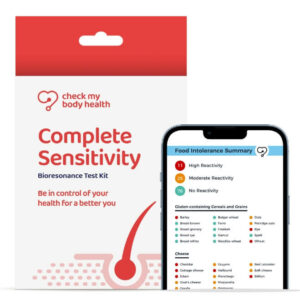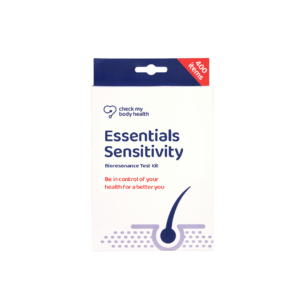Lack of Concentration in Adults & How To Improve Focus

Medically reviewed by Sian Baker, Dip ION mBANT mCNHC
on April 01, 2023. To give you technically accurate, evidence-based information, content published on the Check My Body Health blog is reviewed by credentialed professionals with expertise in medical and bioscience fields.

Lack of focus, sometimes called brain fog, is a condition characterised by a feeling of mental confusion or decreased cognitive function. People with brain fog may experience symptoms such as forgetfulness, difficulty concentrating, slow thinking, and difficulty finding words. Brain fog can also be accompanied by physical symptoms such as fatigue, headaches, and muscle aches.
Brain fog can have a variety of causes, including stress, lack of sleep, poor diet, hormones, medical conditions such as fibromyalgia or chronic fatigue syndrome, and certain medications. In some cases, brain fog may be a symptom of a more serious underlying condition, such as depression, anxiety, or a neurodegenerative disease.
If you are experiencing persistent symptoms of brain fog, it is important to seek medical advice. A healthcare professional can help identify the underlying cause and recommend appropriate treatment. Treatment may include lifestyle changes, such as getting adequate sleep and exercise, as well as medication or therapy, if needed.
What are the signs of trouble focusing
- Difficulty paying attention to details
- Easily distracted by external stimuli
- Struggling to follow through on tasks or complete assignments
- Frequently switching between activities or tasks
- Forgetting important details or information
- Difficulty organising thoughts or prioritising tasks
- Avoiding or procrastinating tasks that require mental effort
- Frequently losing focus or getting sidetracked
- Difficulty sustaining attention for long periods of time
- Feeling overwhelmed, frustrated, or unmotivated
What should I do if I having trouble focusing
Here are some ideas you can try if you’re having trouble focusing:
- Get organised: Use a planner or to-do list to prioritise tasks and stay on track.
- Establish a routine: Stick to a consistent schedule and structure your day to maximise focus and productivity.
- Minimise distractions: Turn off notifications, close unnecessary tabs or apps, and find a quiet space to work.
- Take breaks: Regularly taking breaks can help refresh your mind and improve focus when you return to work.
- Exercise and eat well: Regular physical activity and a healthy diet can improve brain function and concentration.
- Get enough sleep: Adequate sleep is essential for mental clarity and focus.
- Practice mindfulness: Mindfulness techniques, such as meditation or deep breathing, can help calm your mind and improve focus.
- Consider seeking help: If you have persistent difficulty focusing, it may be helpful to speak with a mental health professional for further evaluation and treatment.
- Evaluate your work environment: If your workplace is affecting your focus, consider talking to your manager about making changes.
Remember, focusing is a skill that can be improved with practice and persistence. Try different strategies to find what works best for you.
Possible reasons for concentration problems
It’s important to identify the underlying cause of your concentration problems in order to address them effectively. If you’re having persistent difficulties, it may be helpful to speak with a healthcare provider for a thorough evaluation.
There are many possible reasons for concentration problems, including:
- Sleep deprivation: Lack of sleep can affect your ability to concentrate and pay attention.
- Stress: High levels of stress can interfere with focus and attention.
- Mental health conditions: Attention and focus can be impacted by conditions such as depression, anxiety, ADHD, and others.
- Substance abuse: Alcohol and drug use can impair focus and attention.
- Medications: Certain medications can cause side effects that affect focus and concentration.
- Chronic fatigue syndrome: This condition can cause persistent fatigue and make it difficult to concentrate.
- Poor diet: A diet lacking in essential nutrients can impact brain function and concentration.
- Chronic pain: Chronic pain can be distracting and affect focus and attention.
- Environmental factors: Distractions, noise, and a cluttered work environment can all impact focus.
- Ageing: As we age, it is normal for our attention and focus to decline, although this can vary from person to person.
What health conditions are related to trouble focusing
There are several health conditions that can be related to trouble focusing, including:
- Attention Deficit Hyperactivity Disorder (ADHD)
- Depression
- Anxiety disorders
- Bipolar disorder
- Sleep disorders such as insomnia or sleep apnea
- Chronic fatigue syndrome
- Substance abuse
- Neurological conditions such as Parkinson’s disease or multiple sclerosis
- Traumatic brain injury (TBI)
- Vitamin and mineral deficiencies such as iron-deficiency anaemia or a B-vitamin deficiency
These conditions can impact attention, focus, and overall brain function, and it’s important to seek medical advice if you suspect you may be affected by any of these conditions. In some cases, treatment for the underlying condition can help improve focus and attention.
What can I do to improve my focus
Here are some strategies you can try to improve your focus:
- Get enough sleep: Adequate sleep is essential for mental clarity and focus.
- Exercise regularly: Physical activity has been shown to improve brain function and enhance focus.
- Eat a healthy diet: A balanced diet rich in essential nutrients can help improve focus and brain function.
- Minimise distractions: Turn off notifications, close unnecessary tabs or apps, and find a quiet space to work.
- Take breaks: Regular breaks can help refresh your mind and improve focus when you return to work.
- Practice mindfulness: Mindfulness techniques, such as meditation or deep breathing, can help calm your mind and improve focus.
- Use to-do lists and prioritise tasks: Having a clear idea of what you need to do can help you focus and stay on track.
- Limit caffeine and sugar: Consuming too much caffeine or sugar can lead to energy crashes that affect focus.
- Establish a routine: Stick to a consistent schedule to optimise focus and productivity.
- Seek professional help if needed: If you have persistent difficulty focusing, it may be helpful to speak with a mental health professional for further evaluation and treatment.
Remember, focus is a skill that can be improved with practice and persistence. Try different strategies to find what works best for you, and don’t be afraid to seek help if you need it.
What is vitamin D?
Vitamin D is a fat-soluble vitamin that plays a number of important roles in the body. It is essential for the proper absorption of calcium and phosphorous, which are necessary for healthy bones and teeth. Vitamin D is also important for the immune system and may play a role in the prevention of certain diseases. It is found in a few foods, but it can also be synthesized by the body when the skin is exposed to sunlight.
What’s the difference between vitamin D and vitamin D3?
Vitamin D is the general term used to describe a group of fat-soluble secosteroids that are important for the absorption of calcium and phosphorous, and for the maintenance of healthy bones and teeth. Vitamin D3, also known as cholecalciferol, is one form of vitamin D. It is synthesised by the body when the skin is exposed to sunlight and is also found in some foods. Vitamin D3 is converted to its active form, calcitriol, in the body. Another form of vitamin D is vitamin D2, also known as ergocalciferol. Vitamin D2 is found in some foods and is also available as a dietary supplement. Both vitamin D2 and vitamin D3 can be converted to calcitriol in the body and are therefore considered to be biologically active forms of vitamin D.
Similarities between vitamin D2 and vitamin D3?
Vitamin D2 and vitamin D3 are both forms of vitamin D, which is a fat-soluble vitamin that plays an important role in maintaining bone health. Both forms can be converted to an active form called 1,25-dihydroxyvitamin D, which helps to regulate the body’s levels of calcium and phosphorus, and is essential for the formation and maintenance of strong bones.
The main similarity between vitamin D2 and D3 is that both forms can be converted to the active form of vitamin D and thus can perform the same functions. Both forms also can be obtained from food sources, including fatty fish, egg yolks, and fortified foods, and through exposure to sunlight.
The main difference between the two forms of vitamin D is the source. Vitamin D2 is found in some foods, including mushrooms and yeast, and can be synthesised by plants. Vitamin D3 is produced by the skin when it is exposed to sunlight and also obtained from animal-sourced foods such as fish, egg yolk, and liver.
Which form of vitamin D is better?
Both vitamin D2 and D3 are forms of vitamin D that can be converted to the active form and perform the same functions in the body. However, some studies have suggested that vitamin D3 may be more effective at raising and maintaining blood levels of vitamin D than vitamin D2.
One study published in the American Journal of Clinical Nutrition found that vitamin D3 was more effective than D2 at increasing blood levels of vitamin D (https://www.ncbi.nlm.nih.gov/pmc/articles/PMC3349454/). Another study found that vitamin D3 supplements were associated with a greater increase in 25-hydroxyvitamin D, the main form of vitamin D found in the blood, compared to D2 supplements.
Some researchers have pointed out that vitamin D2 has been considered as less potent as D3, however both forms of vitamin D are expected to have the same end effects in health. The most important thing is to have a proper dosage of it and maintain a healthy lifestyle, get enough sun exposure and consume a balanced diet.
It is important to note that, when it comes to getting the right amount of vitamin D, the best approach is to consult a healthcare professional and follow their recommended dosage, regardless of whether you choose D2 or D3.
References
- Alhola P, Polo-Kantola P. Sleep deprivation: Impact on cognitive performance. Neuropsychiatr Dis Treat. 2007;3(5):553-567.
- Sherwin BB. Estrogen and cognitive functioning in women: lessons we have learned. Behav Neurosci. 2012;126(1):123-127. doi:10.1037/a0025539
- Henderson VW. Progesterone and human cognition. Climacteric. 2018;21(4):333-340. doi:10.1080/13697137.2018.1476484
- Bégin ME, Langlois MF, Lorrain D, Cunnane SC. Thyroid Function and Cognition during Aging. Curr Gerontol Geriatr Res. 2008;2008:474868. doi:10.1155/2008/474868
- What is ADHD?. Centers for Disease Control and Prevention. Accessed January 10, 2020. (https://www.cdc.gov/ncbddd/adhd/facts.html#SignsSymptoms)
- Generalized Anxiety Disorder. National Institute of Mental Health. Accessed January 10, 2020. (https://www.nimh.nih.gov/health/statistics/generalized-anxiety-disorder)
- Anxiety Disorders. National Institute of Mental Health. Accessed January 10, 2020. (https://www.nimh.nih.gov/health/topics/anxiety-disorders)



